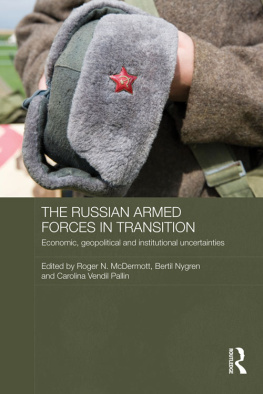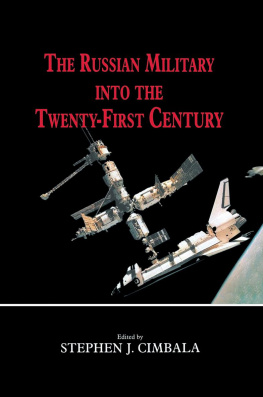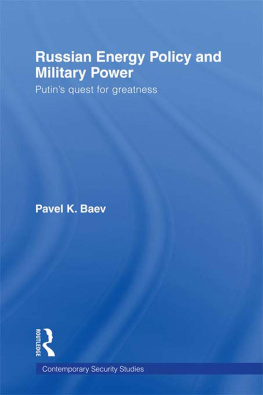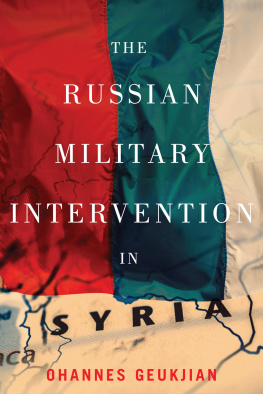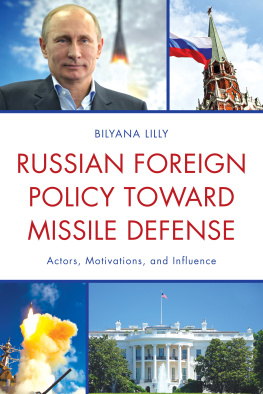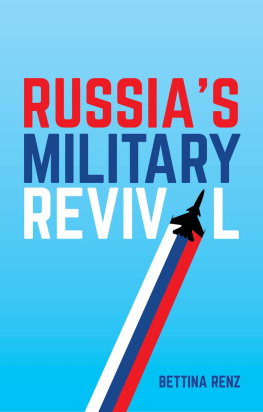The Transformation of Russias Armed Forces
At no time since the end of the Cold War has interest been higher in Russian security issues and the role played in this by the modernization of Russias Armed Forces. The continued transformation of its Armed Forces from Cold War legacy towards a modern combat capable force presents many challenges for the Kremlin. Moscows security concerns domestically, in the turbulent North Caucasus, and internationally linked to the Arab Spring, as well as its complex relations with the U.S. and NATO and its role in the aftermath of the Maidan Revolution in Ukraine in 2014 further raises the need to present an informed analytical survey of the countrys military, past, present and future. This collection addresses precisely the nature of the challenges facing Russian policymakers as they struggle to rebuild a combat capable military to protect Russian interests in the twenty-first century.
This book is based on a special issue of the Journal of Slavic Military Studies.
Roger N. McDermott is Affiliated Senior Analyst, Danish Institute for International Studies, Copenhagen. He is also, Senior International Fellow, FMSO, Fort Leavenworth; Advisory Scholar: Military Affairs, Center for Research on Canadian-Russian Relations (CRCR) Georgian College Ontario, Canada; Senior Fellow in Eurasian Military Studies, Jamestown Foundation, Washington, DC.
The Transformation of Russias Armed Forces
Twenty Lost Years
Edited by
Roger N. McDermott
First published 2015
by Routledge
2 Park Square, Milton Park, Abingdon, Oxon, OX14 4RN, UK
and by Routledge
711 Third Avenue, New York, NY 10017, USA
Routledge is an imprint of the Taylor & Francis Group, an informa business
2015 Taylor & Francis
All rights reserved. No part of this book may be reprinted or reproduced or utilised in any form or by any electronic, mechanical, or other means, now known or hereafter invented, including photocopying and recording, or in any information storage or retrieval system, without permission in writing from the publishers.
Trademark notice: Product or corporate names may be trademarks or registered trademarks, and are used only for identification and explanation without intent to infringe.
British Library Cataloguing in Publication Data
A catalogue record for this book is available from the British Library
ISBN 13: 978-1-138-80530-9
ePub eISBN 13: 978-1-317-61816-4
Mobipocket/Kindle eISBN 13: 978-1-317-61815-7
Typeset in ITC Garamond Light
by RefineCatch Limited, Bungay, Suffolk
Publishers Note
The publisher accepts responsibility for any inconsistencies that may have arisen during the conversion of this book from journal articles to book chapters, namely the possible inclusion of journal terminology.
Disclaimer
Every effort has been made to contact copyright holders for their permission to reprint material in this book. The publishers would be grateful to hear from any copyright holder who is not here acknowledged and will undertake to rectify any errors or omissions in future editions of this book.
Contents
Roger N. McDermott
Stephen Blank
Roger N. McDermott
Jacob W. Kipp
Daniel Goure
Timothy Thomas
Alexander Golts
Keir Giles
Dmitry (Dima) Adamsky
The following chapters were originally published in the Journal of Slavic Military Studies, volume 27, issue 1 (March 2014). When citing this material, please use the original page numbering for each article, as follows:
Chapter 1
Preface: Special Issue: Russias Armed Forces Transformation: 20 Lost Years (title in special issue)
Roger N. McDermott
Journal of Slavic Military Studies, volume 27, issue 1 (March 2014) pp. 13
Chapter 2
Introduction to Special Issue 27(1): Lt. Kizhe Rides Again: Magical Realism and Russian National Security Perspectives
Stephen Blank
Journal of Slavic Military Studies, volume 27, issue 2 (June 2014) pp. 310357
Chapter 3
The Brain of the Russian Army: Futuristic Visions Tethered by the Past
Roger N. McDermott
Journal of Slavic Military Studies, volume 27, issue 1 (March 2014) pp. 435
Chapter 4
Smart Defense From New Threats: Future War From a Russian Perspective: Back to the Future After the War on Terror
Jacob W. Kipp
Journal of Slavic Military Studies, volume 27, issue 1 (March 2014) pp. 3662
Chapter 5
Moscows Visions of Future War: So Many Conflict Scenarios So Little Time, Money and Forces
Daniel Goure
Journal of Slavic Military Studies, volume 27, issue 1 (March 2014) pp. 63100
Chapter 6
Russias Information Warfare Strategy: Can the Nation Cope in Future Conflicts?
Timothy Thomas
Journal of Slavic Military Studies, volume 27, issue 1 (March 2014) pp. 101130
Chapter 7
Reform: The End of the First PhaseWill There Be a Second?
Alexander Golts
Journal of Slavic Military Studies, volume 27, issue 1 (March 2014) pp. 131146
Chapter 8
A New Phase in Russian Military Transformation
Keir Giles
Journal of Slavic Military Studies, volume 27, issue 1 (March 2014) pp. 147162
Chapter 9
If War Comes Tomorrow: Russian Thinking About Regional Nuclear Deterrence
Dmitry (Dima) Adamsky
Journal of Slavic Military Studies, volume 27, issue 1 (March 2014) pp. 163188
Please direct any queries you may have about the citations to
clsuk.permissions@cengage.com
Dmitry (Dima) Adamsky is Associate Professor at the Lauder School of Government, Diplomacy and Strategy at the IDC Herzliya, and is a Head of the B.A. Honors Track in Strategy and Decision Making. Prior to joining the school in 2010, he was a Pre- and Post-Doctoral Fellow at Harvard University, a Visiting Fellow at the Institute of War and Peace Studies, Columbia University and at the Norwegian Institute for Defense Studies. His research interests include international security, strategic studies, cultural approach to IR, modern military thought, nuclear strategy, American, Russian and Israeli national security policy. He has published on these topics in Foreign Affairs, Journal of Strategic Studies, Intelligence and National Security, Studies in Conflict and Terrorism, Journal of Cold War History, Defense and Security Studies and has contributed chapters to edited volumes and encyclopaedias on modern military and international history. His books Operation Kavkaz (Hebrew) and The Culture of Military Innovation (English/Hebrew) earned the annual (2006 and 2012) prizes for the best academic works on Israeli security. In addition to his academic career, in his positions in the Israeli Ministry of Defense and the IDF, Dr. Adamsky has carried out intelligence analysis and strategic policy planning. In the latter capacity, he served as assistant secretary of the committee charged with formulating Israels national security concept.
Stephen Blank is a Senior Fellow at the American Foreign Policy Council in Washington, www.afpc.org. From 19892013 he was a Professor of Russian National Security Studies at the Strategic Studies Institute of the U.S. Army War College in Pennsylvania. Dr. Blank has been Professor of National Security Affairs at the Strategic Studies Institute since 1989. In 19982001 he was Douglas MacArthur Professor of Research at the War College. He has published over 900 articles and monographs on Soviet/Russian, U.S., Asian, and European military and foreign policies, testified frequently before Congress on Russia, China, and Central Asia, consulted for the CIA, major think tanks and foundations, chaired major international conferences in the USA and abroad in Florence, Prague, and London, and has been a commentator on foreign affairs in the media in the United States and abroad. He has also advised major corporations on investing in Russia and is a Consultant for the Gerson Lehrmann Group. He has published or edited 15 books focusing on Russian foreign, energy, and military policies and on International Security in Eurasia. His most recent book is


